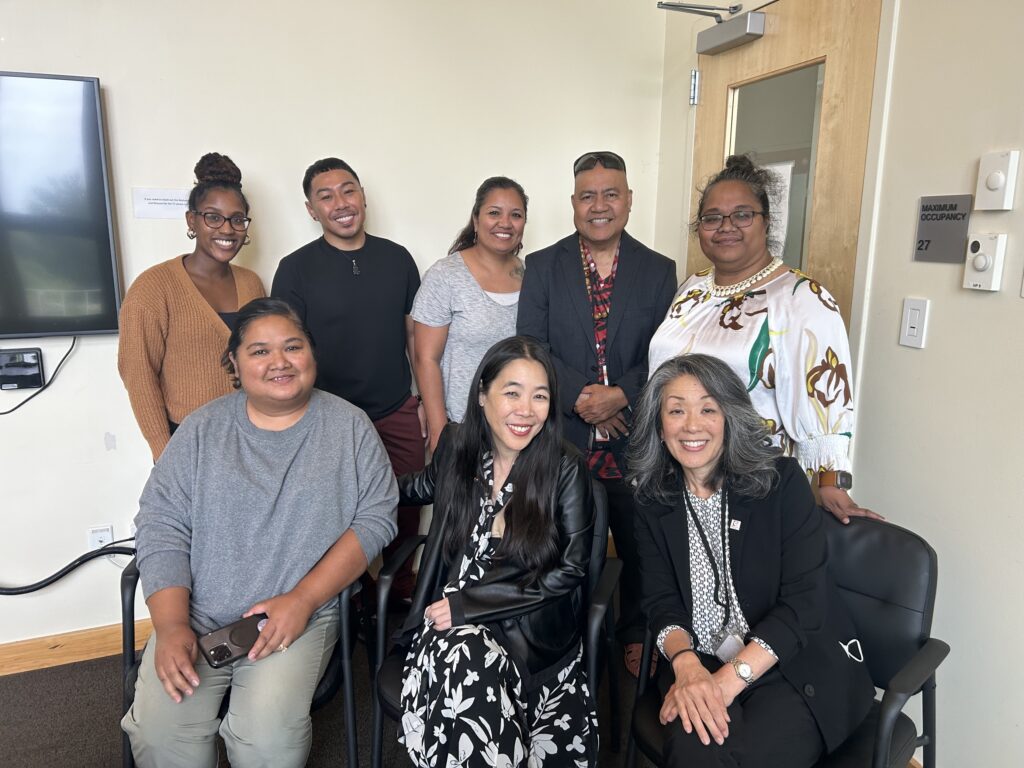
Neighborhood House employees, COFA citizens, and a White House representative
When Cecelia (Cece) Heine started working at Neighborhood House in 2016, she was the first citizen of the Marshall Islands to work here. In 2020, Cece brought on Triple Js Kaminaga to help their community navigate the challenges of COVID.
Together, hundreds of Marshall Islanders sought out Cece and Triple Js for help navigating unemployment benefits. Citizens of the Marshall Islands, Micronesia and Palau have a special non-immigrant status where they have permission of working in the US without a visa. This made it difficult to access unemployment benefits, especially during COVID.
Neighborhood House responded by hiring two more resource navigators to serve the Micronesian and Palauan community. At the same time, we advocated with Washington State’s Employment Security Department’s (ESD) to grant unemployment benefit access to hundreds of COFA citizens during a time of need.
The Compacts of Free Association (COFA) are a series of treaties between the United States, the Federated States of Micronesia (FSM), the Republic of Palau, and the Republic of the Marshall Islands (RMI). These treaties were established as compensation for the loss of life, health, land, and resources due to the numerous nuclear weapons tests on the Marshall Islands and Bikini and Enewetak Atolls conducted by the US from 1946 to 1958.1
More than 94,000 compact migrants live and work in the United States and its territories, according to Census Bureau data.2 The purpose of the Compacts is to allow citizens of these three Freely Associated States to live and legally work in the US without a visa, as well as have access to social and health services. As Cece explains, that hasn’t worked out.
“Now we’re coming to the U.S., but we really don’t have any help from you,” Cece Heine said. “When you needed our help, we gave it to you so you could win your Cold War.”
The COFA treaties are not being upheld and many COFA citizens have been experiencing homelessness, food insecurity, and unemployment. This is caused by a lost or incorrect I-94 (a small piece of paper no bigger than a cell phone), and lack of access to benefits promised in the treaties. Neighborhood House has been working with Customs and Border Protection to address the COFA.
The people impacted by COFA are less than 100,000 people in our country’s population of 300 million, which explains why they were unseen and underrepresented in the past. Neighborhood House is using our influence and connection to the COFA community to advocate for changes to a faulty system.
There is hope in a proposed congressional bill called the Compact Impact Fairness Act (CIFA). It has bipartisan support. CIFA would restore eligibility for COFA citizens to receive public benefits such as Supplemental Nutrition Assistance (SNAP), Temporary Assistance for Needy Families (TANF), Supplemental Security Income (SSI), education assistance and other programs that were restricted as a part of the 1996 welfare reform law.3Keone Nakoa, Deputy Assistant Secretary for Insular and International Affairs at the Department of Interior joined Neighborhood House, Angela Edwards, and other activists to share news about COFA and CIFA on Nov. 2, 2023. To view the video of this Neighborhood House presentation, please click here.
Janice Deguchi, Executive Director
1Compacts of Free Association | U.S. Department of the Interior (doi.gov)
